Blackouts have a way of sneaking up on us. One minute you’re binge-watching your favorite show, and the next—bam—the power is gone, and you’re plunged into darkness. While these outages can be brief, sometimes they drag on for days. The question is, are you ready for an extended blackout?
The good news is that you don’t need a warehouse full of gear to prepare effectively. With some quick and practical steps, you can be ready for whatever comes next. Let’s look at how to prepare yourself and your family before the next big blackout hits.
Step 1: Set Up Alternative Lighting Sources
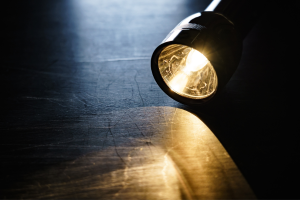 One of the first things that hits you when the power goes out is the darkness. Whether it’s night or just a sunny, cloudless day, losing the lights can be disorienting, and even dangerous. Having a reliable source of light is critical not just for comfort, but for keeping your family and property safe.
One of the first things that hits you when the power goes out is the darkness. Whether it’s night or just a sunny, cloudless day, losing the lights can be disorienting, and even dangerous. Having a reliable source of light is critical not just for comfort, but for keeping your family and property safe.
Imagine trying to navigate your home in pitch black or needing to handle an emergency without proper lighting. To make sure you aren’t fumbling around in the dark, it’s vital to set up alternative lighting sources now before the power goes out.
- Flashlights and Lanterns: Every family member should have access to a working flashlight. Keep flashlights in multiple locations around the house, including on nightstands, the kitchen drawer, and the garage, so they’re easy to grab. LED lanterns are great for lighting up entire rooms and, unlike candles, they’re safer for households with pets or children.
- Headlamps: If you need to get things done during an outage, a headlamp can be a lifesaver. It leaves your hands free, which is perfect for cooking, fixing broken items, or even just reading a book.
- Solar and Hand-Crank Lights: Invest in solar-powered or hand-crank lights. These won’t run out of power like the battery-powered options, making them ideal for extended outages. Just make sure they’re charged up prior to the blackout, or easy to crank even in emergency situations.
- Generate Your Own Power: There are a lot of store-bought generators on the market, but your best option is to make one yourself, using this blueprint. The great thing about this DIY power plant is that you can produce as much electricity as you need, no less, no more.
Step 2: Preserving Food With Minimal Power
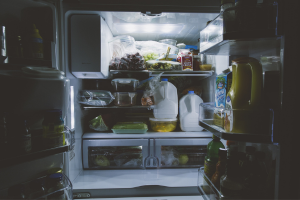 Keeping your food from spoiling during a blackout can be challenging, but with a little planning, you can make it work. When the power goes out, one of the biggest concerns is how to keep your food fresh. Without refrigeration, perishables can go bad quickly, leading to waste and potential food shortages.
Keeping your food from spoiling during a blackout can be challenging, but with a little planning, you can make it work. When the power goes out, one of the biggest concerns is how to keep your food fresh. Without refrigeration, perishables can go bad quickly, leading to waste and potential food shortages.
By taking these simple steps in advance, you can extend the life of your food and ensure your family has enough to eat. Here are some strategies to preserve your food when the refrigerator goes silent:
- Keep Your Fridge and Freezer Closed: The less you open your fridge, the longer your food will stay cold. A full freezer can keep food frozen for up to 48 hours, while a half-full one can last about 24 hours. If you fear a blackout is looming, consider consolidating your freezer contents to one location to help maintain the cold longer.
- Freeze Water Containers: Fill empty soda bottles or plastic containers with water and freeze them. These ice packs will help keep your freezer cold longer and can also be used to chill items in a cooler if needed.
- Dry Goods and Non-Perishables: Stock up on canned goods, pasta, rice, and other non-perishables that don’t require refrigeration. Remember to have a manual can opener handy; nothing’s more frustrating than having plenty of canned food but no way to open and consume it.
- Alternative Cooking Methods: During an extended blackout, your electric stove or microwave won’t do you any good. A propane camp stove or charcoal grill is a great backup option for cooking meals. Just make sure to use them outdoors and away from windows to avoid carbon monoxide poisoning.
- Make an Electricity Free Fridge: You don’t need any power to keep your food from spoiling. This off-grid fridge will preserve meat, milk, eggs, cheese and anything else you need even when it’s over 100 degrees outside.
Step 3: Secure a Backup Water Supply
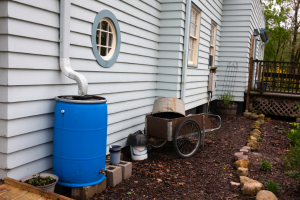 When the power goes out, water may stop flowing, especially if you rely on an electric well pump. Water is one of the most critical resources you need during any SHTF scenario. Without it, cooking, cleaning, and even staying hydrated becomes impossible. That’s why it’s crucial to have a plan for securing a backup water supply.
When the power goes out, water may stop flowing, especially if you rely on an electric well pump. Water is one of the most critical resources you need during any SHTF scenario. Without it, cooking, cleaning, and even staying hydrated becomes impossible. That’s why it’s crucial to have a plan for securing a backup water supply.
- Fill Up Your Bathtub: If you have advance warning of a blackout—like during a storm—fill up your bathtub with water. This water can be used for flushing toilets, cleaning, or even drinking if properly filtered.
- Water Storage Containers: Keep several gallons of water stored in a cool, dark place. The general rule is to store one gallon per person per day for at least three days. Don’t forget about pets—they’ll need water too. Don’t forget about stockpiling water. Here is how you can build your own pressurized rainwater collection system.
- Water Filtration: Consider investing in a portable water filter or purification tablets. If your water supply is interrupted for an extended period, you may need to purify natural water sources like streams or lakes.
Step 4: Maintain Communication Without Electricity
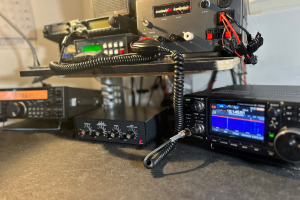 Staying informed during a blackout can make a huge difference. Whether it’s receiving updates on the situation or communicating with loved ones, maintaining some level of communication is key.
Staying informed during a blackout can make a huge difference. Whether it’s receiving updates on the situation or communicating with loved ones, maintaining some level of communication is key.
When the power goes out, your usual means of staying connected, such as the internet and your cell phone, won’t be available. That’s why it’s important to have backup communication options that don’t rely on electricity.
- Battery-Powered or Hand-Crank Radio: A reliable radio is essential for receiving emergency broadcasts. Look for one that can run on both batteries and solar or hand-crank power.
- Charge Your Devices: When a blackout is imminent, plug in all your essential devices and top off their charge. Portable power banks are also a good investment. Make sure they’re fully charged so you can keep your phone running for longer.
- Walkie-Talkies: If the cell network goes down, walkie-talkies can be an invaluable way to communicate with family members nearby. They’re also useful for checking in with neighbors.
Step 5: Heating and Cooling Solutions
Depending on the time of year, a blackout can leave you sweltering in the heat or shivering in the cold. Temperature control is more than just a matter of comfort, it can be a matter of survival. Extreme heat or cold can pose serious health risks, especially for young children and the elderly. It’s important to have heating and cooling solutions in place to keep your family safe and comfortable during an extended power outage.
Related: The First Thing You Should Do in a Winter Blackout
- Staying Warm: If it’s winter, make sure you have plenty of blankets, sleeping bags, and warm clothing. Portable propane heaters are an option, but they need to be used carefully and only in well-ventilated areas.
- Keeping Cool: During a summer outage, stay hydrated and keep shades drawn to block out the sun. Battery-powered fans can help, as can damp towels draped over your body or a cool shower. If you have a basement, consider staying down there—it’s usually cooler than the rest of the house.
Step 6: First Aid and Basic Medical Supplies
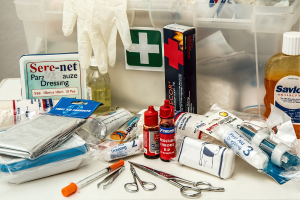 A blackout can complicate an already stressful situation if someone gets hurt.
A blackout can complicate an already stressful situation if someone gets hurt.
Accidents can happen at any time, and without power, even a minor injury can become a major problem.
That’s why having a well-stocked first aid kit is crucial during a blackout. With the right supplies, you can handle minor medical issues and provide care until professional help is available.
- First Aid Kit: Make sure your kit includes bandages, antiseptic wipes, adhesive tape, pain relievers, and any prescription medications that your family may need.
- Backup Power for Medical Devices: If anyone in your household relies on a medical device that requires electricity, you need a backup plan. This could be a portable battery pack or a generator, but whatever you choose, make sure it’s charged and ready to go.
- Your at-home apothecary: Start making your own natural remedies that will help you and family not just in a major blackout, but also in another crisis, when the pharmacies will get looted, and the hospitals the first to become overcrowded. If you don’t know where to begin, there is this guide, written by Dr. Nicole Apelian, that shows you step-by-step how to create the remedies that could become your crisis-proof lifeline.
Step 7: Personal Security Measures
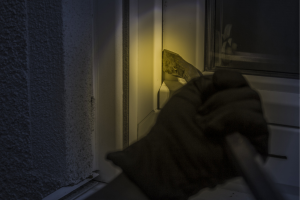 Extended blackouts can lead to increased security concerns, especially if they last several days. In times of crisis, people may become desperate, and security can become a real concern. Taking steps to secure your home can provide peace of mind and help ensure the safety of your family and your property during a prolonged outage.
Extended blackouts can lead to increased security concerns, especially if they last several days. In times of crisis, people may become desperate, and security can become a real concern. Taking steps to secure your home can provide peace of mind and help ensure the safety of your family and your property during a prolonged outage.
- Lock Doors and Windows: Make sure all entry points to your home are locked and secured. If you have outdoor solar lighting, use it to keep key areas of your property lit at night.
- Know Your Neighbors: In times of crisis, having a network of trusted neighbors can be a huge asset. Check in on each other, share resources if needed, and keep an eye out for anything unusual.
Step 8: Keep Yourself Entertained
A blackout can be boring, especially for kids, so having a plan to keep everyone entertained can make the experience much more manageable. Without power, there’s no TV, internet, or video games, which can make the hours drag on. Keeping yourself and your family entertained is important for maintaining morale and reducing stress during an extended outage.
- Board Games and Books: Stock up on board games, puzzles, and books to help pass the time. They don’t require any electricity and can keep both kids and adults entertained for hours.
- Crafts and Activities: Have some arts and crafts supplies on hand. Drawing, knitting, or even building models can help take your mind off the situation.
Related: The Upcoming US Blackout: What To Do Before It’s Too Late
Quick Action Checklist
When the lights suddenly go out, it can be easy to forget what needs to be done. Here’s a quick action checklist to help you stay on track. Print it out and put it in a visible place:
- Grab Flashlights: Ensure everyone has access to a flashlight or lantern.
- Fill Up Water Containers: Fill up your bathtub and any available containers with water.
- Charge Devices: Plug in all essential devices and portable power banks.
- Check Food Supplies: Keep the fridge closed, and gather dry goods and non-perishables.
- Lock Up: Secure all doors and windows, and activate any outdoor solar lights.
- Stay Informed: Turn on your battery-powered or hand-crank radio for updates.
By taking these steps now, you can make sure you’re prepared before the next blackout strikes. Remember, preparedness isn’t about fear—it’s about taking control of your situation and ensuring your family is safe, comfortable, and ready for whatever comes your way. With a little planning and the right supplies, you can turn a stressful blackout into just another minor inconvenience.
You may also like:
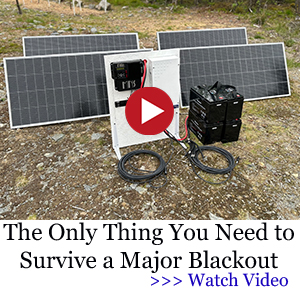 Better Than Walmart: Stores To Get Survival Foods For a Bargain
Better Than Walmart: Stores To Get Survival Foods For a Bargain
How to Avoid Being Targeted by Looters During a Massive Blackout (Video)
The Best States To Live In When A Pandemic Strikes
9 Natural Remedies that People with Diabetes Will Find Useful

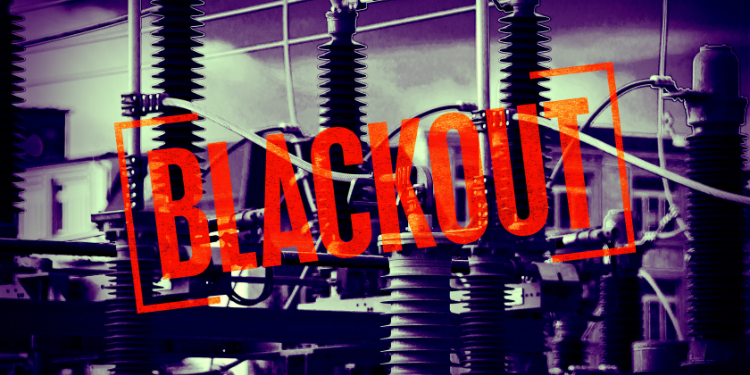







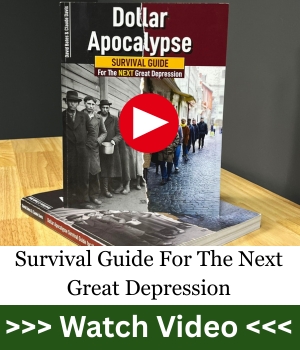












For homeowners – Get Solar with battery backup to run 24/7. For pricing note if you pay full price you will have $$$ available for tax credit for 6 years. Or save the tax credit up front in a lower price of about 30%, with a lender owning title for the 6 years so they can use tax credit. After you get price from solar company, then ask to upgrade battery storage at same price. Keep the lights on.
My GMRS and CB run off of 12 volt, car installs in the shack.
Bofangs tune well to GMRS.
Have not done run time off of car battery, should be a few days used sparingly.
I have a relitively inexpensive converter that I use for powering up Motorcycle / car electrics without them running.
Just dial in voltage and amps to what the expected values aught to be.
Display shows draw.
Find out before the outage which radio stations will provide updates. We had an outage lasting several days, and that’s how I discovered NO stations I typically listened to provided updates, even though some were local stations. .
Also, if the outage is extensive enough, you may pick up other stations you don’t normally hear. That can be both hilarious and frustrating. Frustrating because if you’re trying to get updated to general conditions in your area, you won’t. Hilarious because you may find a podunk station with arcane stories worth listening and laughing to.
I agree with a small battery operated transistor radio was my best buddy to get me through a cold dark night.
Invest in a “solar generator”…another name for a lithium ion battery storage unit with the convenience of 110 and USB outlets. I choose LiFePo4 ( lithium iron phosphate) because it’s inherently safer and holds a charge for many months. Prices are dropping. Buy the biggest one you can afford and opt for solar panels. Not cheap though….they’ll run $500 up to $10k or more depending on storage capacity measured in watt-hours. Or, if you’re inclined, build your own. I’m definitely not a fan of webste schilling for books that “show” you how to build one for “only $39.95 payable in 3 easy payments.” There’s enough free information online. Bluetti, Eco Worthy, Generverse, Jackery, 4Patriots and many other brands are out there. Shop wisely!
We bought a latest model Bluetti and a car charger so that we can charge it with our travel van. We also have a generator. This way, whatever We plan on getting solar in the next year or so, but We’ll well for several weeks on what gasoline we can store in our vehicles and gas cans.
I have engineered a 30 amp power cord to go from my generator to my dryer outlet. Switch off main breaker, so you don’t back feed service, plug in cord, fire up generator. Depending on size of generator, you may need to switch off some unused circuits to keep from overloading your generator. storing small electric heaters or 120 amp A/C window units, make life easier. Just ask a prepper !
Thinking you meant 110/120 volt A/C units. I did the same thing, but wired it into my main breaker box (it was closer). Clearly marked. just gotta figure out how much of your house can run on 25amps. Found out my new 18 seer heat pump doesn’t draw as much as 20 year old builder grade POS.
If you can afford solar panel all over your roof.Battery backups….generators…fuel storage..cb radio towers.You my as well build a bomb shelter and bye a thousand acres of forest land to bug out to in your Tesla truck with your pet pit bulls….and a moon shine still to make your herb tinctures with …..I’m having to much fun….Peace
Outer Spice, hahahaha,,, love that… although I do somewhat resemble your list, with a few exceptions… I moved from a huge Metromess AO, to nice and peaceful rural AO over two years ago… a small old farm house on a few acres in and amongst a forest of big trees… trees fall, limbs fall on power lines, so power outage are semi common here… I do have a solar set up to run my commo and the electronics on my propane kitchen stove..I like to eat… I do and can hook up my multifuel generator to power the entire little old farm house should I choose, but all this depends on a couple factors… one, weather, I truly enjoy fresh air, so Spring/Fall, windows are open, Summer fans come out to play, Winter, my fireplace fires up, Im on propane for hot water, cooking, and central heat, as well as propane jets in each room for space heaters… I have a surface well, with decent water, and a 24/7 spring, with damn good water if I want to tote it… And, hahaha.. for my commo, I do have a 50′ tower, that gets me above most of the trees even though I’m almost on top of the tallest hill in this AO… If it comes to the fact that we need bomb shelters, hahaha.. well, we probably ain’t gonna make it… Im not living in a hole in the ground,,,lol… You did mention moon shine still, now that one has my mind gearing up again… I need a moon shine still, if for nothing more than good ole moonshine … lol… If I could grow tobacco for my hand rolled cigars, I’d be set for the rest of my life… for now, I’ll just stock pile my goods to enclude my Jim Beam, and cigars, and watch the world go round… Live Long and Prosper…
Ya , Poppy….I’m probably a little jealous of people with better preps and more money than me…I really don’t like mandates from communist….covide 19 vaccine’s was the last straw for me…. next on the list ….green energy….So any thing closely related… a red flag pops up in me…..people can experiment with that tech all they want….but don’t even think about making it mandatory with out a good open debate . Plus i believe there could always be a better answer . But that starts with understanding. Thanks for your nice response. P.S. I always like digging holes ….
The last two freezes we had in SE Texas we had power outage. People who had a solar generator used it for 24 hours maybe and then were like the rest of us. No sun. Cloudy and sleet. I guess there is good and bad in about everything trying to get along with no juice. The day the sun came out was also the day power was restored. Go figure but.. they have one and I don’t so who’s goofy??
Don’t answer that lol!!
Dan. Everything has its place and function. Solar generators work for their intended purpose … if they can’t be charged by solar, try the car. Generators will run out of fuel too and be worthless under the right extended conditions. Things have limits. Your thoughts are noted.
Hey…you got money ….go for it….I originally was going to buy a Earth home but i got married .Strike’s, layoffs, different presidents, migration of California to Seattle ,making home prices go through the roof…also they did not change their voting habits. In turn ruining the beautiful state of Washington . I guess my little radio will have to do..Oh…by the way I’m going to change the name of the Sun to MAGA…☮
Native Washingtonian here, and I agree with your assessment on the State’s current condition. The future legislative sessions under ferguson will ensure the downward spiral continues.
Ya…push back is well needed on dem. policy In King County. Washington is truly a wonderful state. DNC over stayed their welcome . Peace
Diesel engines were not designed to run on petrol, but seed oils of any kind will do.
There are some adjustments needed but nothing major. YouTube has many videos about this.Get a tractor with a power take off to run the generator / use seed oils instead of diesel.
Biogas digester for cooking and heating is another option.You can make your own very easily and store it in inflatable whatever.It takes about 3 days to get it going at normal temps, in cold temps you will need to heat the canister or do it inside a Shead or something.You can make the biogas from any dead carbon material.
The carbon material, Lime, water & containment vessel is all that’s needed.
Here is a video i think is the best.
https://www.youtube.com/watch?v=jblgoSRwU44
how to make free gas from leaves
Fabricated 5 minutes
899K subscribers
5,341,504 views Jun 15, 2020
how to make free gas from leaves
leaf
It was great that I successfully researched the free gas system from the leaves.
You can see more at.
• How to turn a Induction cooker into a..
===============================================================
For oil, fat candles use a carbon wick, it won’t burn and will last a long time.
I use my generator for two thing. 1) To get water from my well. 2) To charge my solar generators if there is no sun. Only takes about 1 to 2 hours of generator run time to charge all three of my solar generators if my solar panels don’t work.. ps I can run the well pump off of my solar generator if I need to. I is none 2 are 1.
Converting waste organic material to methane gas can be done but the odds are against you. The vidio would lead you to think it all happens so easy, the reality is the chemistry has to be just right. The bacteria that convert the carbon source to an organic acid goes pretty good, its just like turning cabbage into sauerkraut. The barrel will be pickled and nothing else happens. What you need is for a second group of bacteria to establish themselves that can eat that acid and give off methane as part of their life cycle. They only live and flourish in a very narrow ph range and a little too much acid lime is toxic to them. I was able to do it successfully years ago on the scale of a city wastewater treatment plant but it took a full lab and tutoring from an old chemist in KC, MO. The engineering firm that the city had hired was impressed that I was able to do it in two months time. If you can do it in weeks it is just blind luck. I don’t mean to discourage someone that is interested, just be prepared for some setbacks and false starts.
Drinking alcohol is easy.
Making alcohol takes some practice and lots of labor.
–Moonshine.
Moonshine….